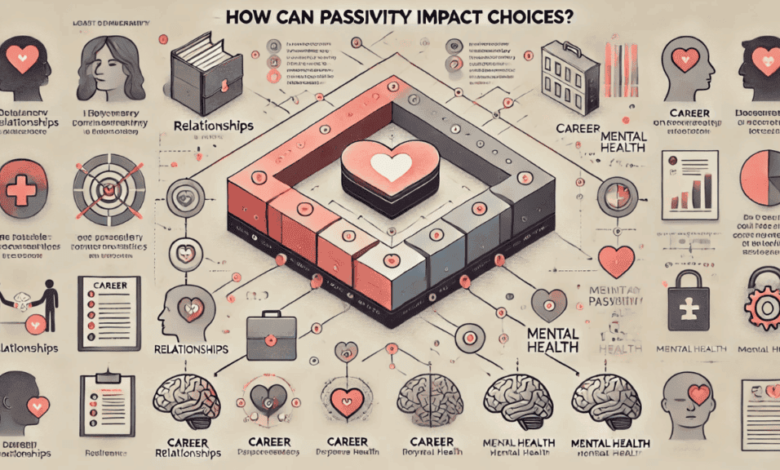How Can Passivity Impact Choises?

Passivity, often defined as the avoidance of assertiveness or decision-making, can significantly affect various aspects of one’s life. When an individual avoids making their own decisions or lets others dictate their choices, it can lead to a life of unfulfilled potential and dissatisfaction. This article explores how can passivity impact choises, shedding light on the implications of passive behavior on relationships, careers, and mental health.
What Does Passivity Look Like?
Before addressing how can passivity impact choises, it’s crucial to understand what passivity entails. Passive behavior is characterized by the avoidance of expressing opinions, desires, or emotions. Instead of voicing their own choices, passive individuals may defer decisions to others, often out of fear of conflict, a lack of confidence, or simply not knowing what they truly want. This tendency can be so ingrained that the individual doesn’t even realize how much their decisions are influenced by external forces.
At its core, passivity impacts a person’s ability to make proactive choices and assert control over their life. This leads to a passive cycle where the individual feels increasingly detached from their own decision-making process.
The Role of Passivity in Relationships
Relationships are one of the most prominent areas where how can passivity impact choises becomes evident. Healthy relationships thrive on open communication, mutual respect, and shared decision-making. However, when one partner is passive, the relationship may quickly become unbalanced. For example, a passive individual might avoid sharing their feelings or expressing their needs, which can lead to misunderstandings and unmet expectations.
In romantic relationships, how can passivity impact choises might manifest as one partner always deferring to the other’s preferences or decisions. Over time, this dynamic can lead to feelings of resentment, as the passive partner might begin to feel neglected or overlooked. Conversely, the partner who is making all the decisions could feel burdened or frustrated, unsure of how to meet the other person’s needs.
In friendships or familial relationships, passivity also impacts how choices are made. The passive individual may feel overwhelmed by others’ opinions or become too compliant, allowing other people to dictate important aspects of their lives. Over time, this lack of voice can lead to emotional distance and dissatisfaction in the relationship.
Professional Life and Career Choices
In the workplace, how can passivity impact choises can significantly hinder professional growth and career progression. Passive employees may avoid speaking up during meetings or fail to advocate for themselves during performance reviews. This behavior can lead to missed opportunities for recognition and advancement. By letting others make decisions or failing to take ownership of projects, passive individuals limit their career trajectory and potential for success.
Passivity also affects workplace dynamics. In team-based environments, where collaboration and input are essential, passive employees may not contribute their ideas or feedback. Their reluctance to engage in decision-making processes can affect the quality of team outcomes and cause tension within the group. Over time, this can lead to feelings of frustration or even exclusion from key projects and initiatives.
One of the main ways how can passivity impact choises in a professional setting is through missed opportunities. When an individual fails to advocate for themselves or assert their ideas, they miss out on chances to move forward in their career. The longer this pattern persists, the more entrenched it becomes, making it harder for passive employees to shift their behavior and take control of their professional life.
How Passivity Can Affect Mental Health
Passivity doesn’t just affect relationships and career choices—it can also have a profound impact on mental health. Constantly suppressing emotions and avoiding self-expression can lead to increased anxiety and stress. The passive individual may struggle with low self-esteem, believing that their needs and opinions are not important. This lack of self-worth can trigger feelings of depression and hopelessness.
Moreover, passivity often leads to an internalized sense of powerlessness. The person who avoids making choices might feel like they lack control over their own life, contributing to a sense of disempowerment. Over time, this can create a vicious cycle where the individual becomes further removed from their emotions and desires, further compounding mental health struggles.
Research has shown that individuals who are passive tend to experience higher levels of stress and anxiety due to the constant suppression of their true feelings. As a result, passivity not only affects an individual’s ability to make choices but also their emotional well-being.
Breaking the Cycle of Passivity
So, how can passivity impact choises in a negative way, and is there hope for change? Absolutely. Recognizing passive behavior is the first step toward breaking the cycle. Once an individual becomes aware of their passive tendencies, they can begin to make changes to reclaim their decision-making power.
Developing assertiveness is key to overcoming passivity. This doesn’t mean being aggressive or domineering; it’s about learning to express thoughts, feelings, and needs clearly and confidently. Start small by practicing assertiveness in low-stakes situations, such as making a choice about where to eat or voicing an opinion in a meeting. Over time, these small changes will build confidence and make it easier to take control of more significant decisions.
Therapy and counseling can also play a vital role in overcoming passivity. A trained therapist can help individuals explore the root causes of their passive behavior and provide strategies for cultivating assertiveness. Through these approaches, individuals can learn to make empowered choices, express themselves more freely, and regain control over their lives.
The Long-Term Effects of Passivity on Choices
The long-term effects of passivity on choices can be profound. If a person consistently defers decision-making to others or avoids asserting their needs, they risk missing out on life-changing opportunities. Whether in personal relationships, professional endeavors, or emotional well-being, the inability to make empowered choices can lead to regret and dissatisfaction.
However, the more a person practices assertiveness and self-expression, the more they can break free from the constraints of passivity. Each decision, whether big or small, is an opportunity to regain control and shape one’s future. By confronting fears of rejection, conflict, or failure, individuals can learn to make choices that reflect their true desires and values.
Conclusion
How can passivity impact choises is a question that speaks to the heart of personal growth and empowerment. Passivity may seem like an easy way to avoid conflict or discomfort, but in the long run, it restricts one’s ability to lead a fulfilling life. It influences every area of life—relationships, careers, and mental health. By recognizing the impact of passivity and actively working to assert oneself, individuals can regain control of their decisions and begin to live a life that aligns with their true goals and aspirations.
In conclusion, overcoming passivity is essential for anyone who wants to make empowered choices. It’s not about being forceful or aggressive; it’s about learning to express one’s thoughts, needs, and desires in a healthy, assertive way. By doing so, individuals can improve their relationships, boost their career prospects, and enhance their mental well-being. How can passivity impact choises? The answer is clear: it can limit potential, but with awareness and effort, it can be overcome, leading to a more fulfilled and empowered life.




I have read some good stuff here. Definitely worth bookmarking for revisiting. I surprise how much effort you put to create such a excellent informative site.
Just wish to say your article is as astonishing. The clearness for your put up is simply cool and that i can suppose you are an expert in this subject. Well together with your permission let me to grasp your RSS feed to keep updated with approaching post. Thanks 1,000,000 and please continue the rewarding work.
I’ve learn several excellent stuff here. Definitely price bookmarking for revisiting. I surprise how much attempt you put to create such a excellent informative website.
Rattling superb visual appeal on this site, I’d rate it 10 10.
Some really interesting details you have written.Assisted me a lot, just what I was looking for : D.
Thank you for another informative site. Where else could I get that type of info written in such an ideal way? I’ve a project that I’m just now working on, and I have been on the look out for such information.
Der Casino-Willkommensbonus schenkt dir 100 % bis 500 €, 200 Freispiele
und einen Dreh an der Bonus Crab, bei dem weitere
Gewinne lauern. Dann fehlen dir nur noch wenige Schritte, um dein Casino Abenteuer online starten zu können und die virtuellen Automatenspiele zu genießen. Dazu gehören zusätzliche Gelder und zusätzliche Gelder und Drehungen, die Ihnen helfen, mehr zu spielen und Ihre Gewinnchancen zu erhöhen.
Bei Tischspielen bekommt man das Casino-Feeling der alten Schule.
Mit ZetCasino online können Spieler beliebte Tischspiele mit Live-Dealern erleben. Die offizielle Website von ZetCasino bietet
hilfreiche Ressourcen zum Verhalten, wenn Sie voller Vorfreude und Tapferkeit unterwegs
sind.
Darüber hinaus gibt es auch eine breite Sammlung an Tischspielen wie Online Roulette und Online
Blackjack. Falls Sie Ihr Passwort vergessen haben, können Sie einfach
auf die Option “Passwort vergessen” klicken, die nach dem Anklicken von “Anmelden” angezeigt wird, und Sie erhalten einen Link zum Zurücksetzen des
Passworts per E-Mail. Wenn Sie nach der Anmeldung
auf Ihr Konto zugreifen, Einzahlungen vornehmen und spielen möchten, klicken Sie auf die Option “Anmelden”.
© 2025 zetcasinoofficial.com – Sämtliche Inhalte unterliegen dem Urheberrecht.
Dies hilft Deutsch Kunden, auch in Stoßzeiten schnelle Antworten zu erhalten. Dadurch wird sichergestellt, dass etwaige Einstiegsprobleme schnell behoben werden. Spieler können rund um die Uhr
über Live-Chat, E-Mail oder eine Hotline Hilfe erhalten.
References:
https://online-spielhallen.de/umfassende-vegaz-casino-bewertung-meine-10-jahrige-spielerfahrung/
If you have any questions about this product, or you want
any other weather or climate information, please contact us.
They cover how the data are obtained, how they are processed, and what each column means.
Take control of your data. NNW winds shifting to ENE at 15
to 25 km/h. Mostly cloudy.
Winds southerly 15 to 25 km/h tending southeasterly in the middle of
the day then becoming light in the late evening.
Overnight temperatures falling to around 14 with daytime temperatures reaching the mid to high 20s.
Winds south to southwesterly 15 to 20 km/h turning southeasterly 15 to 25 km/h during the morning
then becoming light during the evening.
References:
https://blackcoin.co/luck-nation-casino-real-money-pokies-australia/
Always read the terms and conditions before accepting any bonuses.
Follow this simple guide made for Aussies to step into the
world of online gambling confidently. Each
round can result in a player win, banker win, or a tie,
making every game unpredictable. Online Roulette invites players to place a bet on numbers, colours, or
sections of a spinning wheel. These organisations abide
by strict rules and offer regular audits to ensure advanced security and fair play.
You’ll find that global licenses from expert regulatory bodies –
like the Curaçao Gaming Authority or Gaming Control Anjouan – back many
offshore casinos.
The bonus offering is strong, featuring a welcome package worth
up to A$8,000 across the first four deposits — all with
player-friendly terms, including unusually low wagering requirements of just 35x and no cashout limits.
With over 10,000 pokies, hundreds of jackpots, 50 crash games, top-tier live dealer platforms from Evolution and Pragmatic Play, and a wide variety of other products,
there’s plenty to enjoy. New players can claim 20 free
spins on signup (no deposit required), followed by a 100% first deposit bonus up to A$300
— all with no wagering. While it lags behind in progressive jackpots (only offering a few), all its pokies are set to the maximum RTP, giving players higher
chances of winning. Like Thor Casino, most of its bonuses are free from
wagering requirements, which is perfect for players who dislike
restrictions and value freedom over their funds. The loyalty program is one of the highest
value ones we’ve found in Australia, offering up to 1.5% rakeback
on pokies and 0.37% on other games.
References:
https://blackcoin.co/roulette-tutorial/